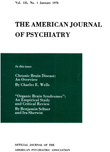THE EFFECT OF DEANOL ON THE ACTIVITY OF CHRONIC SCHIZOPHRENIC PATIENTS
Abstract
For both the OT and ward evaluations, the scores used were the combination of the ratings by the pairs of raters. In the OT setting both drug and placebo groups showed a consistent trend toward improvement as might be expected from adaptation to the experimental situation. This trend was statistically significant on 3 of the 4 measures used. However, the major hypothesis was not supported in that there were no discernible differences between drug and control groups in amount of change. This suggests that the addition of deanol had no appreciable effect in making the subjects more ready to respond in this treatment situation.
The ratings of ward behavior revealed no recognizable changes for either the experimental or control groups. As a further indication that deanol was ineffective in producing the type of improvement anticipated, the occupational therapists, ward physicians, and other ward personnel involved were unable to guess better than chance at the end of the experiment which patients had been receiving the drug and which placebo.
Laboratory investigation during the test period included weekly determinations of SGP-transaminase, urine ictotest, hemoglobin, white blood count and differential and gamma globulin turbidity, with a monthly serum alkaline phosphatase determination. The only side effect of the drug noted was a transient leucocytosis in one patient.
These results are regarded as casting doubts on the therapeutic value of deanol for chronic schizophrenic patients.
Access content
To read the fulltext, please use one of the options below to sign in or purchase access.- Personal login
- Institutional Login
- Sign in via OpenAthens
- Register for access
-
Please login/register if you wish to pair your device and check access availability.
Not a subscriber?
PsychiatryOnline subscription options offer access to the DSM-5 library, books, journals, CME, and patient resources. This all-in-one virtual library provides psychiatrists and mental health professionals with key resources for diagnosis, treatment, research, and professional development.
Need more help? PsychiatryOnline Customer Service may be reached by emailing [email protected] or by calling 800-368-5777 (in the U.S.) or 703-907-7322 (outside the U.S.).



